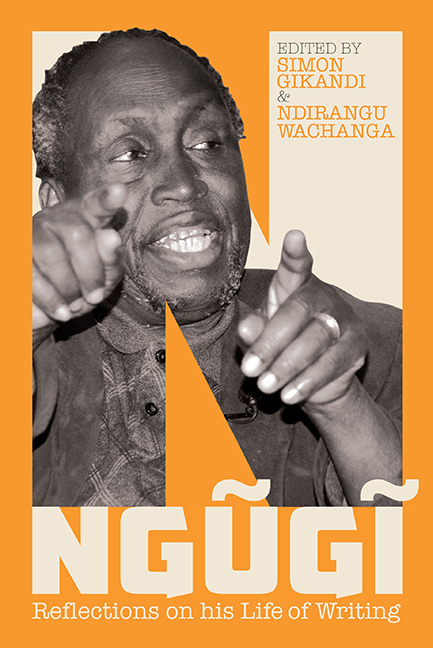Book contents
- Frontmatter
- Contents
- Preface
- Acknowledgements
- Chronology
- Photographic Section
- Introduction: Ngũgĩ wa Thiong'o: Reflections on His Life of Writing
- Ngũgĩ at Work
- Part I Serenades & Beginnings
- Part II Memories, Recollections & Tributes
- Part III Working with Ngũgĩ
- Part IV The Writer, the Critic & the World
- Part V The Other Ngũgĩ
- Appendixes
- Appendix A Review of Wizard of the Crow: Ngũgĩ's Homecoming Gift to Kenyans
- Appendix B Directing the River Back to its Course
- Appendix C For Grant Kamenju
- Appendix D Intellectuals, European & African Languages: Between Enslavement & Empowerment
- Appendix E A Riddle of Love
- References
- Bibliography of Ngũgĩ's Primary Works
- Works Cited
- Notes on Contributors
- Index
Appendix A - Review of Wizard of the Crow: Ngũgĩ's Homecoming Gift to Kenyans
from Appendixes
Published online by Cambridge University Press: 27 July 2019
- Frontmatter
- Contents
- Preface
- Acknowledgements
- Chronology
- Photographic Section
- Introduction: Ngũgĩ wa Thiong'o: Reflections on His Life of Writing
- Ngũgĩ at Work
- Part I Serenades & Beginnings
- Part II Memories, Recollections & Tributes
- Part III Working with Ngũgĩ
- Part IV The Writer, the Critic & the World
- Part V The Other Ngũgĩ
- Appendixes
- Appendix A Review of Wizard of the Crow: Ngũgĩ's Homecoming Gift to Kenyans
- Appendix B Directing the River Back to its Course
- Appendix C For Grant Kamenju
- Appendix D Intellectuals, European & African Languages: Between Enslavement & Empowerment
- Appendix E A Riddle of Love
- References
- Bibliography of Ngũgĩ's Primary Works
- Works Cited
- Notes on Contributors
- Index
Summary
In 2004, Ngũgĩ wa Thiong'o came home after 22 years in exile. Ngũgĩ told Kenyans that his homecoming gift to them was the novel Wizard of the Crow, then in its Gĩkũyũ version. Fundamental changes in a society, including revolution, undertaken and carried out successfully by its people, and led by a patriotic political leadership, constitute one part of the core story and message of Wizard of the Crow.
Ngũgĩ demystifies dictatorship by focusing on its cardinal ingredients. And the dictators Ngũgĩ talks about are men. Some of these ingredients of dictatorship, for example, are murder, rape, and corruption; there is the greed of the dictator who struggles to centralize, own and control all the resources of his country, decadent masculinity, staunch heterosexuality and male chauvinism; and there is also homophobia, religious confusion, political illnesses, patronage and reliance on foreign military and foreign economic, social, cultural and political support, not to mention poverty, unemployment, disease, environmental degradation and low quality and unpatriotic education. Though fictionalized, one can identify the Ruler in the novel as Kenyatta, Bokassa, Mobutu, Banda, Mugabe, Moi and other African dictators all rolled up in one.
The nemesis of dictatorship is resistance. This resistance is led by an organization, the Movement of the Voice of the People. This movement is led by multi-ethnic and multi-racial youth. The central committee of the movement has six male youth and five female youth. The chair of the committee is a woman. The key cadres of the movement are also youth who organize and direct the People's Assembly. These youth are university educated and most of them are unemployed. The movement has a base in the mountains and caves of the Aburiria. The base has farms, an army, library, hospital, and an art museum. Aware of the insecurity of bases because of military exercises carried out by local and foreign troops and the militarization of outer space, the movement relies on the bases of the people, which have no specific location. The ideology and politics of the movement is staunchly anti-dictatorship and anti-anything that dictatorship stands for.
In the resistance movement, Ngũgĩ glorifies the leadership of women and youth.
- Type
- Chapter
- Information
- NgugiReflections on his Life of Writing, pp. 205 - 207Publisher: Boydell & BrewerPrint publication year: 2018



